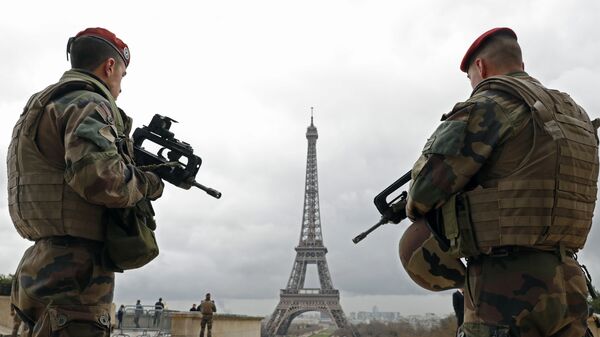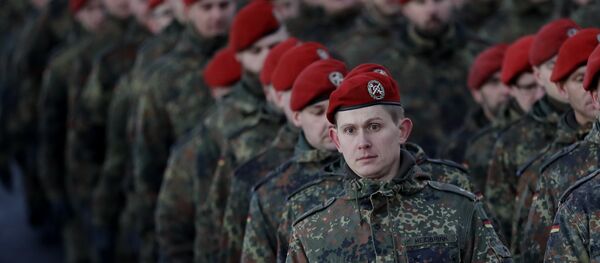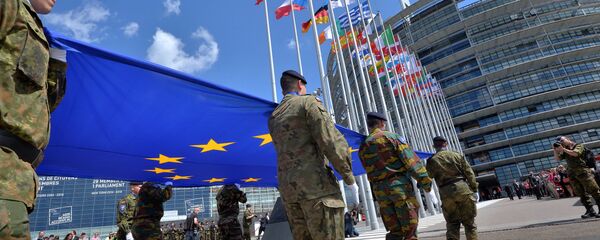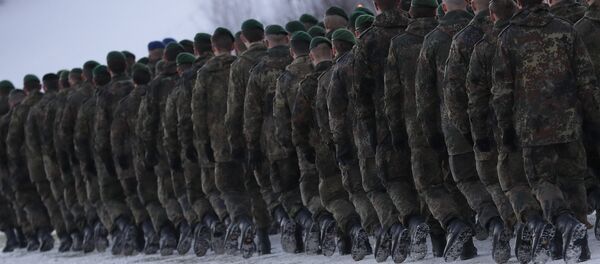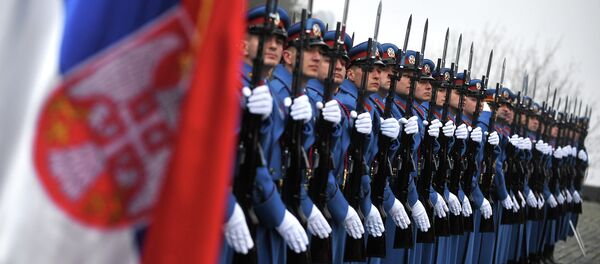Macron said on Tuesday he wanted "a real European army" to protect the Europeans from harm. But experts believe it is impossible to seriously discuss the creation of such a military entity as long as there is no single political body at the helm of the European Union.
"This idea is putting the cart before the horse … A European army could only exist if there is a European nation, a big political entity governed by one single political body, which consolidates all these states. When it’s done, we can talk about an army," Gen. Jean-Claude Allard, a former French representative in the US Central Command, said.
Cart Before the Horse
The general, who is a senior research fellow at the French Institute for International and Strategic Affairs (IRIS), explained that it was up to the politicians to run the army as one.
Jean-Vincent Brisset, a retired Air Force brigadier general and a senior research fellow at IRIS, told Sputnik that an army requires a single leadership approach and cannot be managed by representatives of several states.
"We need to align the regulations. We need a ‘European Federation,’ and since it’s a Europe of nations we’re going to need 28 votes for every decision, and it seems difficult to have an army like this. The same goes for commanding. If the European army has a unique leadership, who will command it, will it be a national or multinational unity?… As long as there is no common European government, there is no serious discussion on the European army. We cannot have a leadership of 27, 28 people," he said.
No Common Vision of Threat
A common army is supposed to protect the Europeans from a common threat. Macron said greater protection was needed against "China, Russia and even the US." But experts believe there is no common vision of an enemy in the union, and attempts to paint Russia as one are rather a publicity move.
"The difficulties are, firstly, the notion of Europe – is it the EU, or all European countries, or a group of European countries? Now it’s a group of nations each having its prime minister, its president, its parliament and its people. Do these states have a common vision of a threat? I think we can say no," Allard said.
"It’s about showing off before the people who fear Russia. But it’s not only Russia, all historical examples show that a threat can come from different places. Create an army to protect against Russia? One has to first prove that Russia wants to attack Europe. And why would Russia attack Europe? I don’t see any reason for that. We have to be able to face all threats," Allard argued.
Brisset also said it was surprising to see Russia cast as an enemy again, while the West continued ratcheting up military presence on its frontiers.
"It’s interesting. I knew the epoch when the enemy was clearly the USSR. Then there was an epoch when we believed there was a huge progress, we announced that the French striking force was all azimuths, that it was capable of striking in all directions and not only in the direction of the USSR. Now we return to the idea of Russia as an enemy, while, unless proven the opposite, it’s the Western troops who approached the Russian frontiers, and not the contrary," the expert said.
Different Laws and Capacities
Experts pointed to significant differences between the EU nations in terms of their military capacities and regulations, which could also become an obstacle for the creation of a common defense force.
Some states that consider the possibility of creating a common army, he said, would welcome it as long as they do not need to contribute. "Other states had some discourse around the European army saying that it’s good as long as we don’t have to pay."
What About Nato?
Macron has long advocated for EU’s greater military autonomy. He has also maintained that France could not rely on the United States when it comes to European security. However, experts doubt that EU countries can create an effective defense structure.
"French politics was always based on saying 'we cannot only count on NATO to protect us.’ But it also proves that we need political cohesion before creating an army … So as soon as the European politicians always have the same political line no matter what they can create an army. In the other case it is a pure and simple waste … If president Macron and other two-three European leaders find this idea appealing, they will instruct their armies and they will create this European army, that’s for sure … But the operational results, the capacity of this army to protect itself no matter the threat seems questionable to me," Allard said.
"All these are the problems that pile up, and which seem to be extremely difficult to regulate. Than there is a problem with NATO: will we disconnect with NATO, will we create an army competitive to NATO? What do we do with the equipment? The examples of Poland, Belgium or Italy show that there is a number of countries that do not want to be equipped with the European weapons," Brisset said.
The experts also pointed to earlier attempt to create a unified European defense force. For instance, a 1952 treaty established a European defense community, which never came into being. Other efforts were limited to one-off operations, like the Franco-German Brigade, which took part in the conflict in Bosnia and Herzegovina in 1996 and in military campaigns in Afghanistan.
